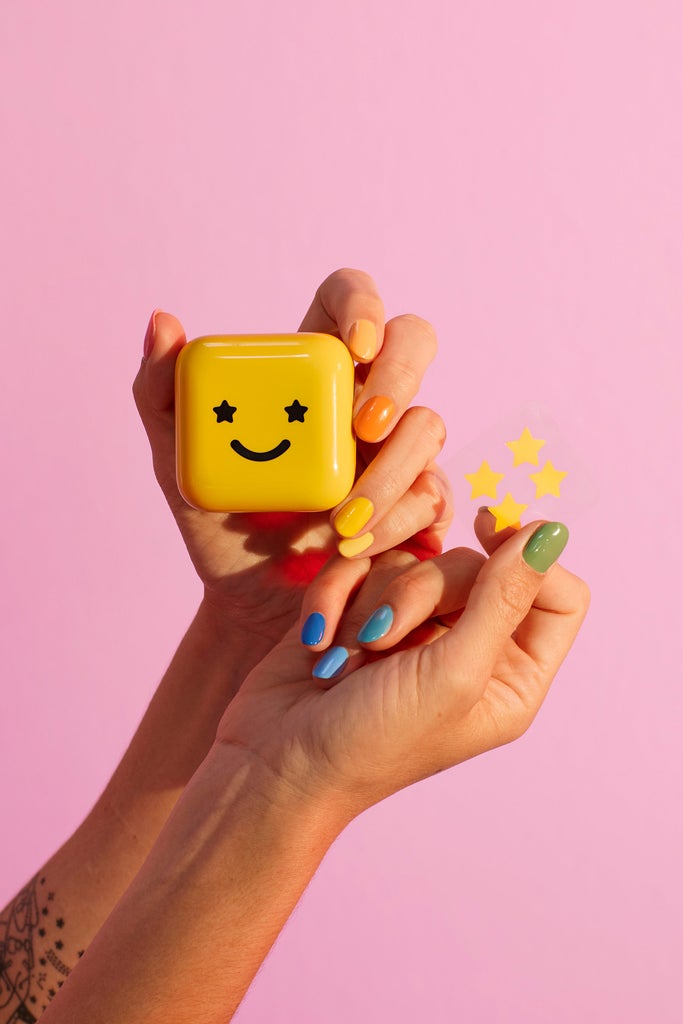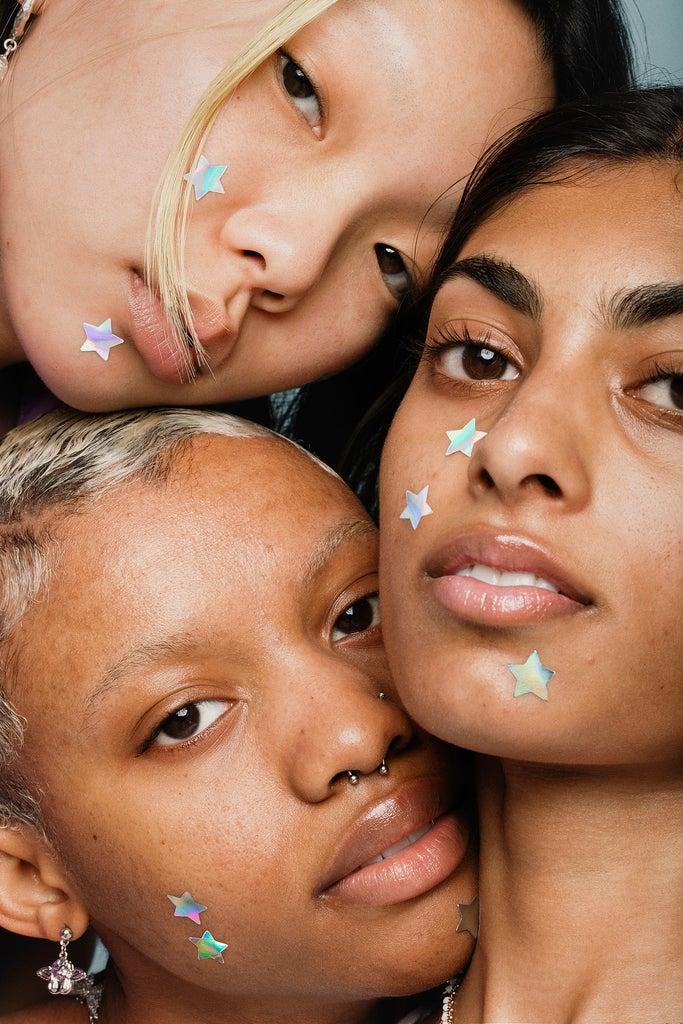If I say ‘hot new beauty brand’, what do you imagine? Perhaps no-makeup makeup, just a lick of mascara and lip balm? A minimal colour scheme, probably in millennial pink? Perhaps fronted by an impossibly glossy A-list darling with their own painfully cool aesthetic? Well, how about highlighter-yellow packaging, dedicated acne products and a spokesperson in the form of a giant, grinning, space-dwelling cosmic entity named Big Yellow? Enter: Starface.
Founded by former Elle US beauty director Julie Schott and her business partner Brian Bordainick in 2019, Starface is an increasingly popular acne care line, with the emphasis on ‘care’. “Acne can happen at any point in your life for any number of reasons,” explains Schott, who had acne throughout her 20s. “Towards the end of my media career, all I was seeing was this look of the effortless cool girl who doesn’t need makeup and who has naturally really even skin. It’s not attainable for so many people, and not having perfect skin doesn’t mean you’re not drinking enough water or you’re not taking care of yourself. Sometimes that’s just your skin! We just wanted to put forward something more fun, more attainable and more honest.”

Starface’s Best Products
The brand’s first launch was Hydro-Stars, £11.99: neon yellow, star-shaped hydrocolloid patches that come housed in a little plastic version of Big Yellow. (The packaging has been compared to AirPods but I think it’s a little more Lego-esque.) For the uninitiated, hydrocolloid patches absorb spot secretions to promote healing and dissuade picking. They’re usually clear and circular, and worn overnight. “Acne patches are more common now but when we started this journey, they weren’t,” says Schott. “We couldn’t even find a manufacturer who was willing to make the star-shaped ones. People said, ‘Why would anyone want to wear a patch people can see?’ But the purpose was to make this uncomfortable moment and turn it into something positive and self-acceptance and pride, almost.”
This is the key Starface difference: they’re choosing to enhance and accentuate where other brands might conceal. “I said to myself, ‘What if we approached acne differently?’ I’ve spent so much time feeling ugly and not self-confident, and honestly almost like I don’t know how to take care of myself, like I’m some kind of failure,” explains Schott. “I don’t think anyone should have to feel that way, teenagers or adults. What if we could change that? Acne products always use words like ‘blemish’ and ‘imperfection’, and I thought, let’s start there. Let’s change that conversation.”
Soon followed Space Wash, £8.99, a gentle foaming cleanser which gets rid of oil and makeup without making skin feel tight or stripped, as well as other colour variations of Hydro-Stars, such as Black Star, £11.99, Party Pack, £8.99 and Rainbow Star, £8.99, which donates 100% net proceeds to the Black-Led Movement Fund and the Hetrick-Martin Institute for LGBTQ+ Youth in the U.S., Black Thrive in the U.K., and Black Women in Motion in Canada. And then there’s Moisture On Mars, £10.99, a light, oil-free moisturiser; Clear as Day SPF 46, £18.99, an invisible, broad spectrum sunscreen designed specifically with acne-prone skin in mind; and other acne-focused skincare products.
Schott notes that they’ve recently been able to bring prices down as the business has increased in scale. “I don’t like the idea of luxury pricing for the sake of it,” adds Schott. Everything’s vegan, cruelty-free, pregnancy-safe and formulated to meet U.S. retailer Credo Beauty’s ‘clean’ beauty standards, which Schott indicated were the strictest they could find. “When you have reactive, acne-prone skin, trying new products can be really stressful and anything can break you out,” she says.
As for Big Yellow, the choice to have a non-human ‘face’ was deliberate. “When you see a human face, it’s just another place to compare yourself and project yourself,” explains Schott. “Young people already have so many arenas for comparison, and we didn’t want to be another place for that. I found myself thinking about animated series from childhood, things like Snoopy and Peanuts and Pokémon that just make you feel good no matter what.”
The idea of skin positivity can be difficult. For me, it’s more about neutrality, and not having your sense of worth wrapped up in your skin.
Julie Schott, starface
Taking The Shame Out Of Acne
Acne touches more and more of us with every passing year, with 85% of 12 to 24-year-olds experiencing it and more than 50% of women in their 20s experiencing breakouts (these numbers continue to rise among those in their 30s and 40s). The psychological effects of chronic skin conditions can be devastating and life-altering. In 2020, the All-Party Parliamentary Group on Skin conducted a report on the mental health impact of skin conditions, of which acne is included. When asked in the survey, 98% of respondents reported that their skin condition had affected their emotional wellbeing, and 93% said that their skin condition had affected their self-esteem.
Plenty of people who get spots know how irritating and upsetting it is to receive unsolicited skincare advice from strangers on public transport or on social media, and how you can end up feeling at war with your skin. “It’s always, ‘Eat this one thing, don’t eat this one thing’,” recalls Schott. “And then the idea of skin positivity in itself can be difficult. For me, it’s more about neutrality and not having your sense of worth wrapped up in your skin. Acceptance and comfort in our skin is a goal, and being able to feel desirable and worthy regardless of what your skin looks like, not a case of ‘When I have clear skin I can do XYZ’. You can spend so much time waiting to look a certain way and I think that’s just a waste of life.”

The sceptical position is that it’s all just cute branding, there are heaps of acne-control products on the market and Starface is still just trying to make your spots go away. How can Starface square skin acceptance with skin-improving products? “Really, I want to encourage people to celebrate individuality,” says Schott. “I’m probably always going to have some spots and that’s okay with me. Finding joy is more important to me! I don’t want a product by my sink that says ‘blemish’ or ‘imperfection’ or that implies I don’t have my shit together somehow. No one should have to spend money on that unless they want to. You’re spending money on this, it should be nice to you!”
Why shouldn’t your acne-care products make you feel positive and encouraged, and not like a patient?
Like it or not, the messaging and world created around a brand changes how you feel using it, especially in the social media age where our favourite brands also make memes, reply to our comments and even show support and allyship for political movements. We invite them into our worlds and they invite us into theirs.
For the same reasons you’d likely boycott a brand if its founder made racist remarks or underpaid its workforce, we’re also more likely to embrace a brand that does good, both for us and for the world at large. Using Biologique Recherche probably makes you feel Parisian and fabulous, using La Mer makes you feel decadent and using Glossier makes you feel like an off-duty model. So why shouldn’t your acne-care products make you feel positive and encouraged, and not like a patient?
The sky’s the limit for Starface’s future, but as Schott sees it, the ultimate goal is to change the conversation, not just your complexion. “Skincare can be a safe space, a fun space, a non-comparison place of wanting your pores to be smaller or smoother,” she adds. “There are endless ways to feel inadequate and less than on the internet. We don’t want to be one of them.”
At Refinery29, we’re here to help you navigate this overwhelming world of stuff. All of our market picks are independently selected and curated by us. All product details reflect the price and availability at the time of publication. If you buy or click on something we link to on our site, we may earn a commission.
Like what you see? How about some more R29 goodness, right here?
Acne Doesn’t Make You ‘Unprofessional’ At Work